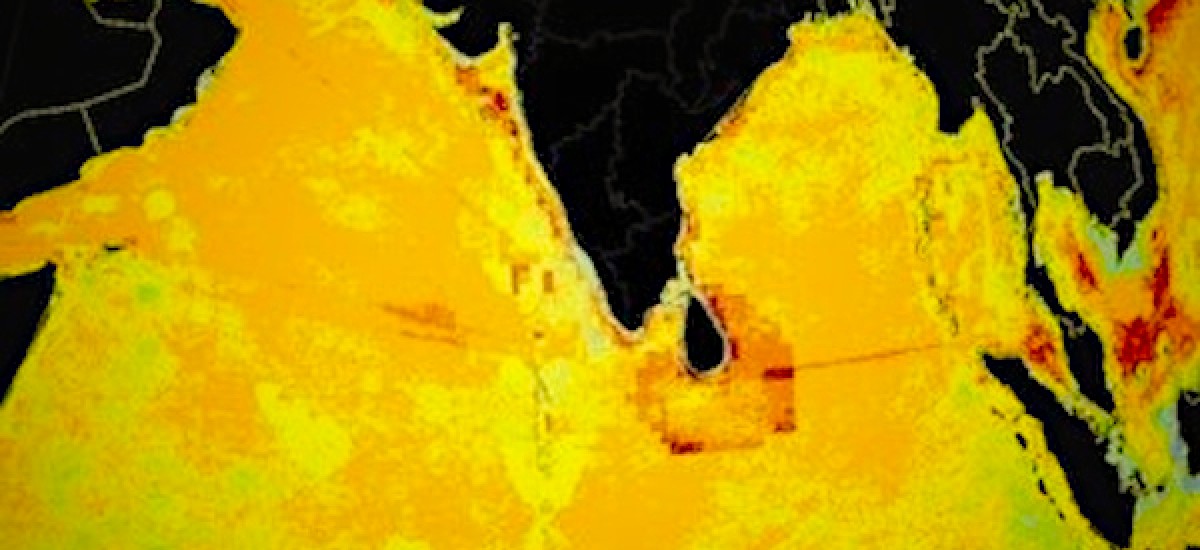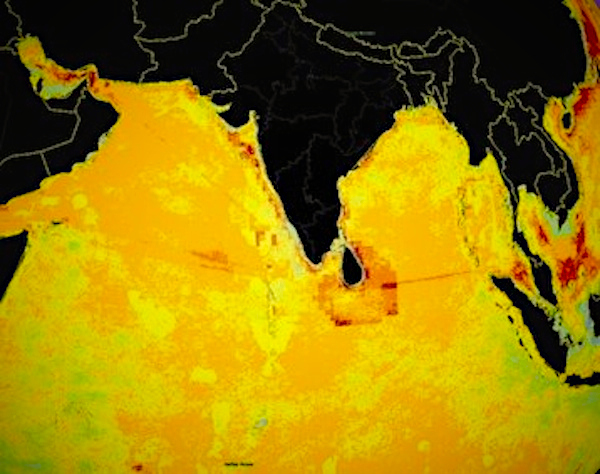Sri Lanka is exposed as the worst polluter of the Indian Ocean. The new maps on human impact on the world’s oceans are now on the web (http://www.nceas.ucsb.edu/globalmarine ). Although there had been regular commentary on the need of every government and various authorities to be cognizant of oceanic health, it was a shock to see the evidence that is now before us. The map of the Indian Ocean shows an ugly halo of pollution and ocean impact that rings the ocean around Sri Lanka. The irresponsible use of our land, cutting the forests, eroding the soil and drenching it with artificial fertilizers and agro/ industrial toxins, finally result in polluting the ocean. First there was the loss of the rock pool corals, then the shore corals, next the fringing shallow reef and finally the deep reef. We saw these degrade and disappear within our lifetime, but the extent of the damage to the ocean around us was not even remotely realized until the advent of satellite sensing.
We are indeed responsible for a lot of pollution from our land but there is another contributor to this damage. We know that a major maritime passage for shipping runs through our territorial waters, but we do not seem to be willing to enforce our rights to control pollution in our waterways. This aspect was pointed out continually to the GoSL since 1995 when the subject was first brought to the attention of the government in a letter to Hon.Minister of Environment on 20.10.1995. I quote:
“One urgent issue is that of Marine Biodiversity a theme that is scheduled to be discussed at the COP2 due to be held in Jakarta in November this year. Sri Lanka is constantly placed in a position of jeopardy vis-a-vis our marine biodiversity and fisheries potential by the inherent threat that super tankers laden with oil. It is a fact that these tankers pass through our national waters on an intensive basis. Yet it appears that we have not yet invoked the CBD in protecting ourselves against the imminent danger. It may be in the interests of this nation to have our representative to the COP focus on this issue as one of our national strategies.”
In terms of national interest, it was argued that, the question of accountability was crucial, as we did not have the resources to deal with disasters of large magnitude. Relevant sections of the convention were pointed out, for instance, a relevant article of the convention was article 14 of the CBD, which addresses ‘Impact Assessment and Minimizing Adverse Impacts’. This article is crucial, as it requires countries to use biodiversity as a criterion for its proposed projects with a view to avoiding or minimizing negative impact. This article also requires states to take initiative in reporting to other states of an imminent danger to the biological diversity of that state. Where possible it encourages joint contingency plans. Further, it was pointed that the clause on liability and redress (14.2) has been downplayed by many developed country nations and by their media as it goes against the commercial interests of those nations.
It was suggested that if Sri Lanka as a nation, were to raise these points and request the COP (Conference of Parties to the CBD) to examine these questions, we could take the initiative in building up a system of accountability that will give our nation some degree of protection from the oncoming environmental crises. It was unfortunate that the Sri Lankan delegates who attended the Conference of Parties (COP) of the CBD were totally uninterested in promoting any such national contribution on the subject and chose to ignore the advice given on the conference floor.
At that time the Executive Director of the Environment Liaison Center International (ELCI) offered to help Sri Lanka to protect its territorial waters and biodiversity potential. An outline for a response strategy was proposed:
A workshop on aspects of marine pollution organized jointly between a Government agency and the Environment Liaison Center International (ELCI) where The findings will be distributed to the international media and the convention secretariat. Sri Lanka could then commission a study to develop a response strategy to the perceived threats. The outcome of the study was to have been tabled the COP of the CBD to be held in Buenos Aries in October 1996.
Such a study could have provided a set of maritime rules for potential dangerous traffic passing through our waters and could institute a monitoring system (such as that being developed by the University of Tucson) designed for the surveillance of the Southern and Eastern oceanic waters.
As ELCI was headquartered in Nairobi they agreed to support its presentation to the Global Environmental Facility (GEF). The gain, in both economic input and national security terms can be substantial.
However, up till today there has been no response from the GoSl and nothing has been done to control ship based pollution or insure that a tanker accident will not cripple our economy, by the galaxy of agencies concerned. There is poor possibility for pursuing accountability if ships have no insurance against such eventualities. A robust risk analysis and subsequent risk insurance should be implemented at a minimum, a robust monitoring program will then become practical.
As an island nation we must be ever vigilant of the productivity and condition of our coastal waters. What happened in Koggala in 2006 involving a small commercial vessel has given us warning. A small spill has demonstrated that it can contaminate over 3 kilometres of beach with a black, tar like, toxic, sludge that is guaranteed to deter tourists and effect fisheries. We cannot afford any such losses. What happened at Koggala was a foretaste of things to come. Unless these is some clear, rational thinking, how we can protect two of our most valuable resources., fisheries and tourism ? A salient point is to remember that it was fuel oil that had leaked in the Koggala incident and we could not respond effectively, if it was crude oil we would have had no chance. If, a small disabled ship fuel oil can create such substantial quality depreciation of the beaches that the nation relies so much upon. What could a tanker or supertanker do ?
Now let us go back to the massive halo of pollution that rings our island. If the pattern is studies carefully it will be seen that the damage to the ocean extends well beyond the area where land based pollution would be expected to affect. Further, to the east of the halo of pollution a tell tale line of pollution extends in a straight line following the shipping channel. It seems that the shipping is indeed causing a serious impact on our waters. The volume of shipping along this route is expected to increase significantly in the near future. As we do not have any control over this phenomenon, we can expect the ocean pollution around Sri Lanka to increase significantly in the near future.
Further the effect on marine biodiversity, starting with the increased death toll to the pods of whales frequenting our southern waters to the loss of the shallow water coral reefs, can be attributed to a poor capacity to deal with marine biodiversity and marine pollution. When will we realize that just words will not solve the marine pollution problem? We must act !
Until we do so, not only do we stand exposed as the worst polluter of the Indian Ocean but also the nation with the most to loose if there is a serious maritime accident in our waters!


